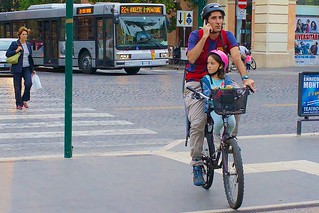
(Photo: Ed Yourdon)
Here are the bike-related links from around the world that caught our eyes this week:
“Road homicide”: It’ll be a new offense in Italy, associated with minimum prison sentences of two to eight years and 15-year bans from driving.
“Bike Batman”: A Seattle engineer who confronts bike thieves and returns bikes to owners describes his work as “kind of fun.”
Skinny biking: A study of 150,000 adults found that bike commuting makes you weigh about 10 pounds less than car commuting would.
Unshaved legs: A 26-year-old Slovakian racer has ignited pro cycling’s latest scandal.
Sidewalk biking: Taipei legalized it, and apparently it’s working.
Criminalized texting: “Using your cellphone while crossing a street could become illegal in New Jersey.”
Fixing Atlanta: The capital of the Southeast may be putting some of its racial divisions aside as it adds bike lanes, streetcars and crosswalks to its central city.
Advertisement
Metrorail shutdown: D.C.’s subway system unexpectedly closed last Wednesday, making bicycles (and apparently skateboards) the fastest way to travel clogged streets.
Transit tweeting: The guy who runs the Twitter account for Bay Area Rapid Transit dropped some late-night real talk about infrastructure during a shutdown, and people liked it.
Autonomous cars: Google has written Three Laws of Robotics for them, supposedly naming walking and biking safety as top priority.
“Stopping gentrification”: One Detroiter leads multicultural bike rides that help her neighbors learn the area’s history from one another.
Anti-gentrification tips: Five bike equity experts offer tips for navigating bike lanes and race politics.
Safety targets: The federal government has for the first time called for all states and regions to set targets for biking and walking safety.
Why people bike: Living in a denser neighborhood makes you more likely to bike or walk if you’re poor, but not if you’re rich, a study found.
Risky tradeoffs: What can buses do to travel faster? Be more dangerous, one man argues.
Portland, boomtown: A Bloomberg columnist visited Portland and left in awe of our relative economic prosperity.
If you come across a noteworthy story, send it in via email, Tweet @bikeportland, or whatever else and we’ll consider adding it to next Monday’s roundup.



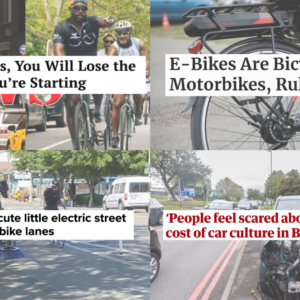
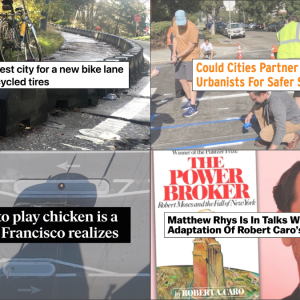
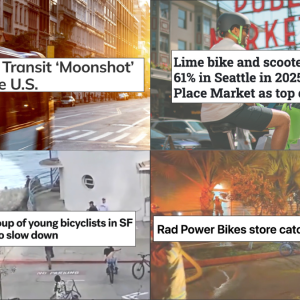
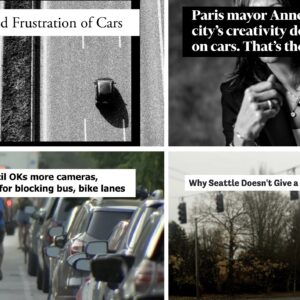
Thanks for reading.
BikePortland has served this community with independent community journalism since 2005. We rely on subscriptions from readers like you to survive. Your financial support is vital in keeping this valuable resource alive and well.
Please subscribe today to strengthen and expand our work.
Faster travel is easiest without stopping. Want faster bus service, get on and off via mailbag.
“A 26-year-old Slovakian racer” is an understatement, Peter Sagan is the current world road race champion and one of the top pro riders.
Would we be more polite and friendly if there were consequences for our actions? After living in Italy for 9 weeks, I’d gladly take a texting and chain smoking Italian driver over the average ‘merican driver. I was safer as a pedestrian in Italy than where I now live.
From the article on Italy cracking down on deadly motorists:
“Anyone convicted of causing injury while driving also receives an automatic five-year ban.”
We can’t even do real license suspensions of our drunk drivers, and they are going after anyone who injures someone and taking them off the road.
I can’t figure out what link the pic “Biking in Rome, 2013” illustrates ?
one hand with the cell phone, one on the bars with daughter sitting on the top bar.
I hope City Buses (at least in the current concept) are a thing of the past at some point in my child’s or grandchild’s lifetime. Putting huge, slow and fuel inefficient vehicles on the roads to try and alleviate traffic and pollution is a paradox I don’t think I’ll ever grasp…
“Putting huge, slow and fuel inefficient vehicles on the roads to try and alleviate traffic and pollution is a paradox I don’t think I’ll ever grasp…”
I think I’m missing the paradox.
Did you forget about the huge, slow, and fuel inefficient vehicles everyone else is driving in that are *creating* the traffic and pollution? I think the buses aren’t faster because of all those other cars. If you want paradox why don’t we start with all the nutty subsidies we persist in throwing at cars and their (mostly) single occupants.
1 person in a car getting 20 miles/gallon = 20 person-miles/gallon.
10 persons in a bus getting 10 miles/gallon (non hybrid) = 100 p-m/gallon.
How do you define efficiency?
Definitions matter.
In the link for the FHWA wanting some accountability for pedestrian and cyclist safety was a graph that shows pedestrian fatalities as a share of all road deaths up nearly 40% in a decade’s time.
Meanwhile, Oregon offers grants to cities to do seatbelt enforcement, as if that’s super important. We need a HUGE increase in general traffic law enforcement with specific targeting of violations that increase the risk to vulnerable users (speeding on surface streets, stop sign and red light running, passing too closely, right of way violation when turning).
Short of building entirely new roads for peds and cyclists that don’t intersect the existing grid but get people everywhere, we’re not going to infrastructure our way out of this. However, we could easily law-enforcement our way out of our deadly mess for a lot less money. Since this would inconvenience scofflaw motorists, of course it’s out of the question.
Ignoring historical police bias, of course. Enforcement tends to fall heavier on those least able to afford the consequences. Talking about personal responsibility is just a way to ignore systemic problems.
If you increase enforcement at the same time you create actual BRT and world class safe bike routes, then it would be easier to agree. But ‘enforcement only’ will solve the problem seems a lot like ‘technology will save us’.